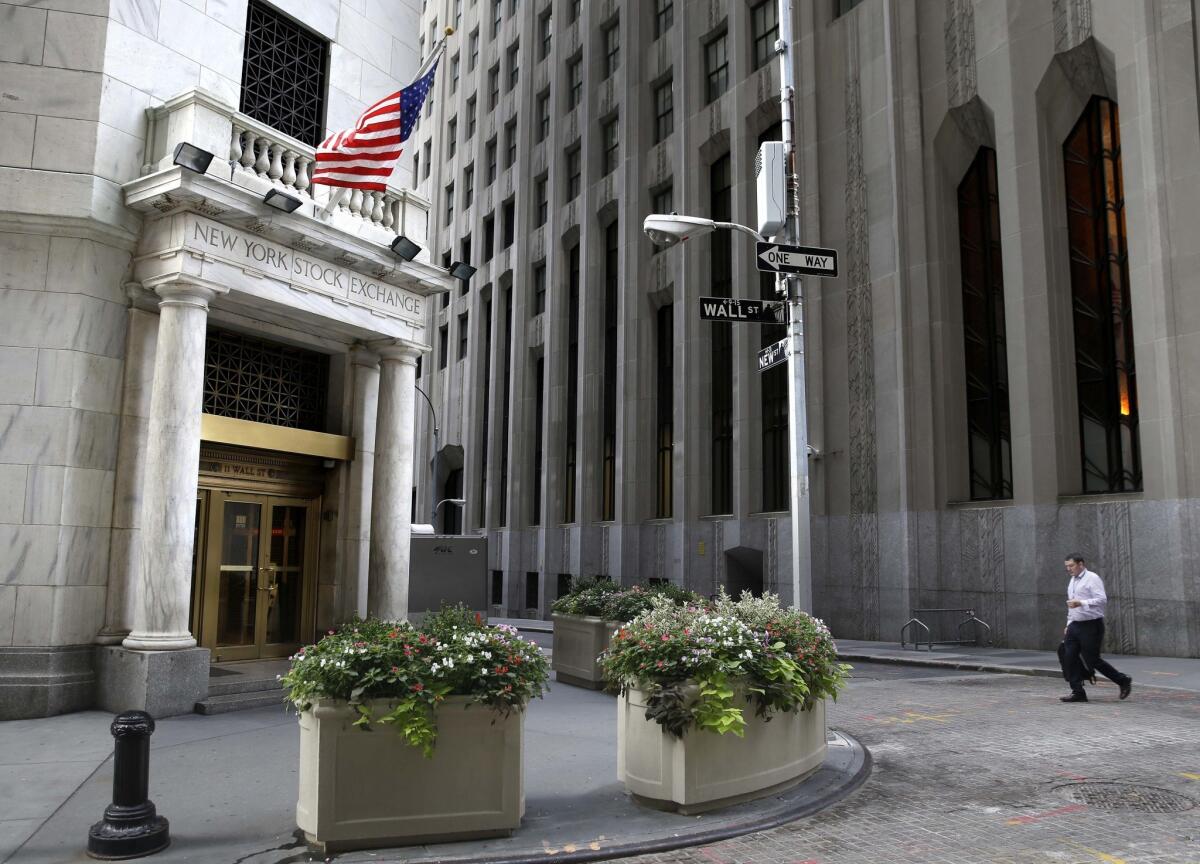Financial firms lead stocks lower after a weak jobs report

- Share via
Banks and other financial companies led a modest decline in U.S. stocks Friday after a report indicating that hiring slowed sharply in May put investors in a selling mood.
The market slide snapped a two-day winning streak and sent bond prices surging as investors sought safety in U.S. government-backed debt. The dollar fell sharply against several major currencies.
The downbeat jobs data appeared to convince traders that the Federal Reserve will keep interest rates low longer than previously expected. It also stirred concerns that the economy is slowing.
“What we don’t want to see is this number as a beginning of a series of weaker data,” said Quincy Krosby, a market strategist at Prudential Financial. “That’s going to affect the market.”
The Dow Jones industrial average fell 31.50 points, or 0.2%, to 17,807.06. The Standard & Poor’s 500 index slipped 6.13 points, or 0.3%, to 2,099.13. The Nasdaq composite index sank 28.85 points, or 0.6%, to 4,942.52.
The Labor Department reported that the U.S. economy added only 38,000 jobs in May, the lowest amount in five years. The unemployment rate fell to 4.7% from 5%, mainly because about half a million unemployed people stopped looking for work.
Separate reports out Friday also showed a mixed snapshot of the economy. The Institute of Supply Management said U.S. services firms grew in May at the slowest pace in more than two years. The Commerce Department said orders to U.S. factories rose in April by the largest amount in six months.
The weak hiring data fueled speculation that the Fed will hold off on raising its key interest rate this summer, something Wall Street was anticipating could happen as soon as July. That weighed on banks and financial services companies, as low interest rates make it harder for banks to make money from loans.
ETrade Financial slumped 5.1% to $26.69, and Charles Schwab dropped 5.3% to $29.22. Bank of America fell 3.5% to $14.42. Citigroup slid 3.4% to $45.39.
All told, companies in the financial sector posted the biggest drop in the S&P 500, sliding 1.4%. The sector is down 1.7% this year and is the only one of the 10 sectors in the index that is negative for 2016.
The prospect of interest rates holding steady made U.S. bonds more attractive, sending their prices sharply higher. That demand spike, in turn, pushed the yield on the 10-year Treasury note down to 1.70% from 1.80% late Thursday.
“Bonds are rallying because the thought that we’re going to see higher rates in the short term has come off the table a bit,” said J.J. Kinahan, chief strategist at TD Ameritrade. “It’s about pure yield.”
The dollar fell to 106.68 yen from 108.91 the day before. The euro jumped to $1.1347 from $1.1148.
Traders also piled money into precious and industrial metals. Gold rose $30.30, or 2.5%, to $1,242.90 an ounce, silver rose 34 cents, or 2.1%, to $16.37 an ounce and copper rose 4 cents, or 2.1%, to $2.11 a pound.
The rally in metals helped polish shares in some mining companies. Newmont Mining jumped 9.4% to $35.40, and Freeport-McMoRan climbed 4.2% to $11.11.
Utilities companies, which had been down of late as investors bet on the Fed raising rates sooner rather than later, surged Friday. The sector was the biggest gainer in the S&P 500, climbing 1.7%. It’s now up 15% this year.
Investors also bid up shares in several companies reporting earnings or sales data.
Broadcom climbed 4.9% to $162.56 after the communications chip maker posted a bigger-than-expected profit in its fiscal second quarter.
Ambarella jumped 9.4% to $46.47 after the video compression chip maker’s profit and revenue topped Wall Street’s expectations.
Gap rose 4.1% to $19.09 after the clothing chain operator reported late Wednesday that sales at established stores declined 6% in May, better than the 7% drop forecast by financial analysts.
Traders were not as welcoming to Zumiez. The clothing retailer fell 4.2% to $14.42 after sales at older stores slumped in its fiscal first quarter.
Benchmark U.S. crude oil fell 55 cents, or 1.1%, to $48.62 a barrel in New York. Brent crude, which is used to price international oils, slid 40 cents, or 0.8%, to $49.64 a barrel in London.
In other energy futures trading, natural gas dropped 1 cent to $2.398 per 1,000 cubic feet. Wholesale gasoline slid 3 cents, or 1.7%, to $1.61 a gallon. Heating oil shed 2 cents, or 1.4%, to $1.49 a gallon.
In Europe, major stock indexes mostly fell. Germany’s DAX fell 1%, France’s CAC 40 lost 1% and Britain’s FTSE 100 rose 0.4%.
Japan’s benchmark Nikkei 225 rose 0.5%, and South Korea’s Kospi inched up 0.04%. Hong Kong’s Hang Seng advanced 0.4%. Australia’s S&P/ASX 200 jumped 0.8%.
ALSO
Review: Mercedes-Benz Metris — the most affordable Mercedes on the road
Lazarus: Lesson 1 at Trump University: The hard sell
SpaceX and insurance underwriters will discuss risks of reusing rockets
UPDATES:
2:25 p.m.: This article was updated with additional information.
1:23 p.m.: This article was updated with closing prices.
7:46 a.m.: This article was updated with additional market information.
This article was originally published at 7:02 a.m.
More to Read
Inside the business of entertainment
The Wide Shot brings you news, analysis and insights on everything from streaming wars to production — and what it all means for the future.
You may occasionally receive promotional content from the Los Angeles Times.










